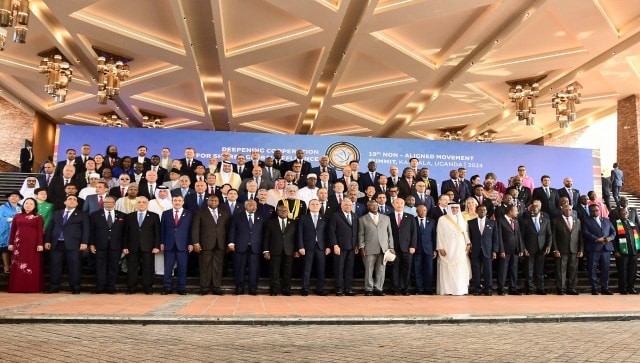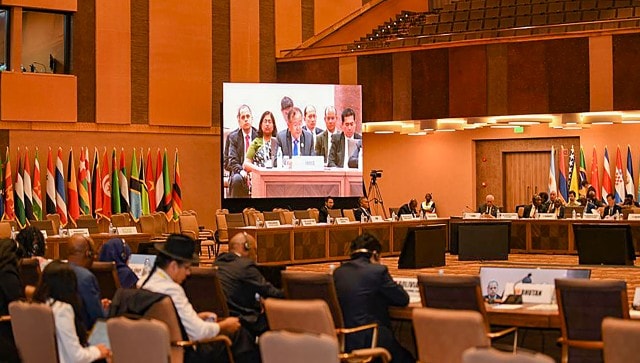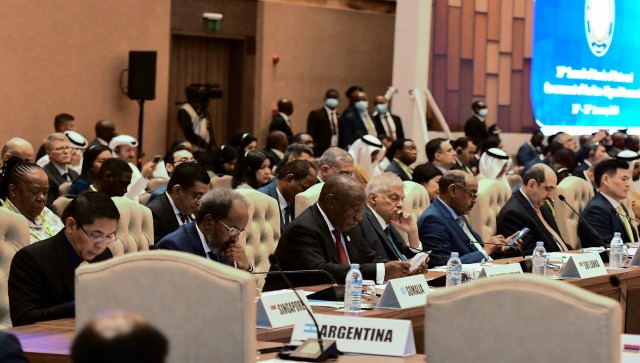The 19th Non-Aligned Movement (NAM) Summit is being held on 19 and 20 January in Uganda’s capital, Kampala. Uganda has taken over as chair from Azerbaijan, to run until 2027. It is one of the biggest global meetings the country is hosting after the 2007 Commonwealth Heads of Government Meeting, as per The East African. Dozens of heads of state and other senior officials from the NAM are attending the summit. The summit will address key issues like multiple conflicts across the world, climate change, inflation, and growth challenges, among others. Here’s all we know about the summit. About NAM Summit Established in 1961 at the height of the Cold War, the Non-Aligned Movement (NAM) is an alliance of developing nations that refuses to identify with any major superpower, according to The Conversation. The NAM, which never became an organisation like the African Union or the Commonwealth of Nations, has its origins in a 1955 conference in Indonesia during which representatives from 29 Asian and African countries, including many newly independent states that had been colonised for years, discussed common concerns. The movement’s founders are President Sukarno of Indonesia, Prime Minister Jawaharlal Nehru of India, Gamal Abdel Nasser of Egypt, and President Josip Tito of Yugoslavia. After the United Nations, NAM is the second-largest grouping of nations. [caption id=“attachment_13637432” align=“alignnone” width=“640”] Leaders from member countries of the Non-Aligned Movement (NAM) pose for a family photograph at the 19th summit, where several issues including global conflicts, climate change, UN reform and others are on the agenda for discussion, in Munyonyo suburb, of Kampala, Uganda. Reuters[/caption] Unlike other local or global organisations, NAM does not have a permanent secretariat or a formal founding charter, act, or treaty. The summit usually takes place every three years. The nation that rotates as chairmanship bears the responsibility of organising and running the Movement’s operations. Its members Currently, NAM membership consists of 120 countries: 53 from Africa, 39 from Asia, 26 from Latin America and the Caribbean, and two from Europe. It also includes the non-UN member state of Palestine, 17 other observer countries, and 10 observer organisations, according to Reuters. India, Venezuela, Iran, South Africa, and Saudi Arabia are among the more influential countries, while China, Russia, and Brazil are among the prominent countries with observer status. NAM’s principles At Tito’s initiative, the first summit of NAM heads of state was convened in 1961 in Belgrade, the capital of Yugoslavia. The summit, which was attended by representatives of 25 nations, was centered on the US-Soviet arms race and the growing chances of war, according to Prague-based corporation, Radio Free Europe, Radio Liberty. The group claims that ever since its founding, it has fought to protect the rights of those who are oppressed “by foreign occupation and domination” to self-determination, the report says. According to NAM, it is dedicated to upholding the UN’s core values of non-use of force and respect for each member state’s sovereignty, territorial integrity, political independence, and security. NAM nations have focused on a number of topics in recent years, including as globalisation, development, food security, and nuclear concerns. All decisions in the movement are made by consensus. The latest edition in Uganda The 19th NAM Summit is being held under Uganda’s leadership under the theme “Deepening Cooperation for Shared Global Affluence.” About 4,000 guests from different member states like India, Nepal, Kenya, Sri Lanka, Vietnam, and Iran, among others, are expected to attend the weekend summit that seeks to address pressing global issues and foster cooperation among member states. As per The East African, the delegates formed two committees – political, and the economic and social – whose negotiations will shape the Kampala Outcome Document that will be adopted by the Foreign Affairs ministers and declared at the Heads of State summit on Saturday. External Affairs Minister Dr S. Jaishankar is leading the Indian delegation at the summit. Key discussions at the summit
Leaders from member countries of the Non-Aligned Movement (NAM) pose for a family photograph at the 19th summit, where several issues including global conflicts, climate change, UN reform and others are on the agenda for discussion, in Munyonyo suburb, of Kampala, Uganda. Reuters[/caption] Unlike other local or global organisations, NAM does not have a permanent secretariat or a formal founding charter, act, or treaty. The summit usually takes place every three years. The nation that rotates as chairmanship bears the responsibility of organising and running the Movement’s operations. Its members Currently, NAM membership consists of 120 countries: 53 from Africa, 39 from Asia, 26 from Latin America and the Caribbean, and two from Europe. It also includes the non-UN member state of Palestine, 17 other observer countries, and 10 observer organisations, according to Reuters. India, Venezuela, Iran, South Africa, and Saudi Arabia are among the more influential countries, while China, Russia, and Brazil are among the prominent countries with observer status. NAM’s principles At Tito’s initiative, the first summit of NAM heads of state was convened in 1961 in Belgrade, the capital of Yugoslavia. The summit, which was attended by representatives of 25 nations, was centered on the US-Soviet arms race and the growing chances of war, according to Prague-based corporation, Radio Free Europe, Radio Liberty. The group claims that ever since its founding, it has fought to protect the rights of those who are oppressed “by foreign occupation and domination” to self-determination, the report says. According to NAM, it is dedicated to upholding the UN’s core values of non-use of force and respect for each member state’s sovereignty, territorial integrity, political independence, and security. NAM nations have focused on a number of topics in recent years, including as globalisation, development, food security, and nuclear concerns. All decisions in the movement are made by consensus. The latest edition in Uganda The 19th NAM Summit is being held under Uganda’s leadership under the theme “Deepening Cooperation for Shared Global Affluence.” About 4,000 guests from different member states like India, Nepal, Kenya, Sri Lanka, Vietnam, and Iran, among others, are expected to attend the weekend summit that seeks to address pressing global issues and foster cooperation among member states. As per The East African, the delegates formed two committees – political, and the economic and social – whose negotiations will shape the Kampala Outcome Document that will be adopted by the Foreign Affairs ministers and declared at the Heads of State summit on Saturday. External Affairs Minister Dr S. Jaishankar is leading the Indian delegation at the summit. Key discussions at the summit
- Israel-Hamas war
One of the key discussions at the NAM summit is Israel’s military campaign on the Gaza Strip. The leaders of NAM countries have denounced Israel’s offensive in Gaza and demanded an immediate ceasefire during the summit. Cuba’s vice president Salvador Valdes Mesa called it “one of the cruelest genocidal acts ever recorded in history,” while Moussa Faki Mahamat, African Union Commission chairperson termed it “the unjust war against the Palestinian people,” as per Reuters. Speaking at the summit, South African President Cyril Ramaphosa, said the war in Gaza had demonstrated the inadequacy of the United Nations, particularly the Security Council, where the United States has vetoed several resolutions critical of Israel. [caption id=“attachment_13637442” align=“alignnone” width=“640”] Minister of State for External Affairs Rajkumar Ranjan Singh during the 19th NAM Summit-Ministerial Meeting, in Kampala, Uganda. PTI[/caption] “We should establish a system of global governance that is fair and equitable, and has the capacity to respond to the needs of all persons in situations of threat and harm,” said Ramaphosa. According to ANI, EAM Jaishankar said that the violence in Gaza requires a “sustainable solution.” “On Gaza, stressed that the humanitarian crisis requires a sustainable solution that gives immediate relief. Terrorism and hostage taking are unacceptable. The conflict must not spread. NAM should seek a two-state solution. The more we share, collaborate and reinforce each other, the more NAM will change the world,” he added. He urged establishing a free Palestinian state by saying, “We must seek a two-state solution where the Palestinian people can live within secure border. Our collective endeavours should focus on making this realisable.” Further referring to the crisis in Ukraine, he cautioned that modern conflicts “anywhere has consequences everywhere.”
Minister of State for External Affairs Rajkumar Ranjan Singh during the 19th NAM Summit-Ministerial Meeting, in Kampala, Uganda. PTI[/caption] “We should establish a system of global governance that is fair and equitable, and has the capacity to respond to the needs of all persons in situations of threat and harm,” said Ramaphosa. According to ANI, EAM Jaishankar said that the violence in Gaza requires a “sustainable solution.” “On Gaza, stressed that the humanitarian crisis requires a sustainable solution that gives immediate relief. Terrorism and hostage taking are unacceptable. The conflict must not spread. NAM should seek a two-state solution. The more we share, collaborate and reinforce each other, the more NAM will change the world,” he added. He urged establishing a free Palestinian state by saying, “We must seek a two-state solution where the Palestinian people can live within secure border. Our collective endeavours should focus on making this realisable.” Further referring to the crisis in Ukraine, he cautioned that modern conflicts “anywhere has consequences everywhere.”
- India’s “Vishwa Mitra” initiative
EAM Jaishankar emphasised India’s role as a friend to the world, or “Vishwa Mitra” to global solidarity and cooperation in his address, reported The Times of India. He said, “India demonstrates this commitment through 600 significant projects in 78 nations. And each one of them respects the choice of our partners. Insofar as Africa is concerned, 300 projects and 45,000 training slots are an expression of our solidarity.”
- A call for multipolar world
EAM Jaishankar also called on the NAM countries to challenge the concentrations undermining their economic security, adding that the voice of NAM is here to stay and grow. He also stressed the need for a reformed United Nations. He highlighted the multiple concerns being faced by the countries belonging to the Non-Aligned Movement, such as climate change, the impact of the COVID-19 pandemic, and multiple conflicts across the world, as well as the triad of debt, inflation, and growth challenges. “A multipolar world with a reformed United Nations at its core is key. Economic decentralisation with a reformed United Nations at its core is key. Economic decentralisation with greater regional production is so as well. But we must also press for cultural rebalancing where all heritage is mutually respected,” PTI quoted him as saying. The minister said transforming the world order requires practical steps. Relevance of NAM today After the Cold War, there is still an economic divide between developed and developing countries. NAM has significant relevance in today’s world as the movement now shifts from a political concept to an economic one. The movement plays a key role in maintaining world peace and preserving the independence of every nation is equally relevant. It acts as a catalyst to foster cooperation between South nations. It also raises key issues of economic, political, and social development to achieve the desired results of moving from developing to developed nations. With inputs from agencies
)